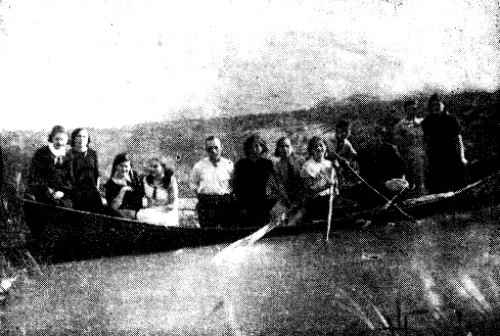 |
Young Jewish folk from Maligan taking a trip on the river
|
|
[Col. 1583]
(Mielagėnai, Lithuania)
55°15'/26°26'
Gershon Braslavski
Translated by Anita Frishman Gabbay
Maligan was in the district of Sventzian, Vidz and Haudutishok, and was surrounded by thick forests. Half of the shtetl was on a mountain, the other half in the valley, through which flowed a small stream into a larger lake.
|
|
Young Jewish folk from Maligan taking a trip on the river |
As the area lent itself to great abundance of produce from the land, many folk made a living as Jewish farmers.
The Jewish families were about 25 in total. The Jewish folk were shopkeepers, farmers and craftsmen. Most important the Maliganers were known for their blacksmiths and tinsmen.
[Col. 1584]
|
|
A group of young Jewish folk during an outing in 1937 |
Maligan was 20 kilometers from Sventzian, and 14 kilometers from Haudutishok: the only communication for many years was a wagon and a horse. Shortly befor WW11, a passenger–auto was the means of transportation between Sventzian and Vilna.
Besides this, many folk used the train station in Haudutishok, 14 kilometers away.
Besides Jews, Lithuanians Russians and Polaks also lived in Maligan. Prior to WW11, the situation between the Jews and the rest of the population was very friendly, and
[Col. 1585]
no one had the foresight that some would turn into bandits, hooligans and robbers.
The Jewish children went to Cheder and Yeshivas like in all the other shtetls. In later years the children went to study in Sventzian and Haudutishok.
[Col. 1586]
A smaller portion of the children went to the Polish “Povshne” school.
The older generation was religious and followed all the religious traditions. Everyone seemed to be in a good economic situation.
|
|
Children–young and old during a Zionist evening in Maligan |
Boruch Gontovnick, Montreal
Translated by Anita Frishman Gabbay
|
In a valley, between flowing rivers, I was brought up, By a father who not very rich, But a righteous peasant, standing before my eyes!
I felt very at home there,
Green fields, covered with flowers, |
[Col. 1586]
|
Jewish peasants, with long beards, Plowed and seeded their fields, With the knowledge, to work their land, Their sweat would bring forth an appetite–to eat black corn bread.
Healthy Jews, with callouses on their hands
The huts were covered in straw,
The houses, with balconies, covered in moss, |
|
|
JewishGen, Inc. makes no representations regarding the accuracy of
the translation. The reader may wish to refer to the original material
for verification.
JewishGen is not responsible for inaccuracies or omissions in the original work and cannot rewrite or edit the text to correct inaccuracies and/or omissions.
Our mission is to produce a translation of the original work and we cannot verify the accuracy of statements or alter facts cited.
 Svencionys, Lithuania
Svencionys, Lithuania
 Yizkor Book Project
Yizkor Book Project
 JewishGen Home Page
JewishGen Home Page
Copyright © 1999-2026 by JewishGen, Inc.
Updated 23 Sep 2018 by JH